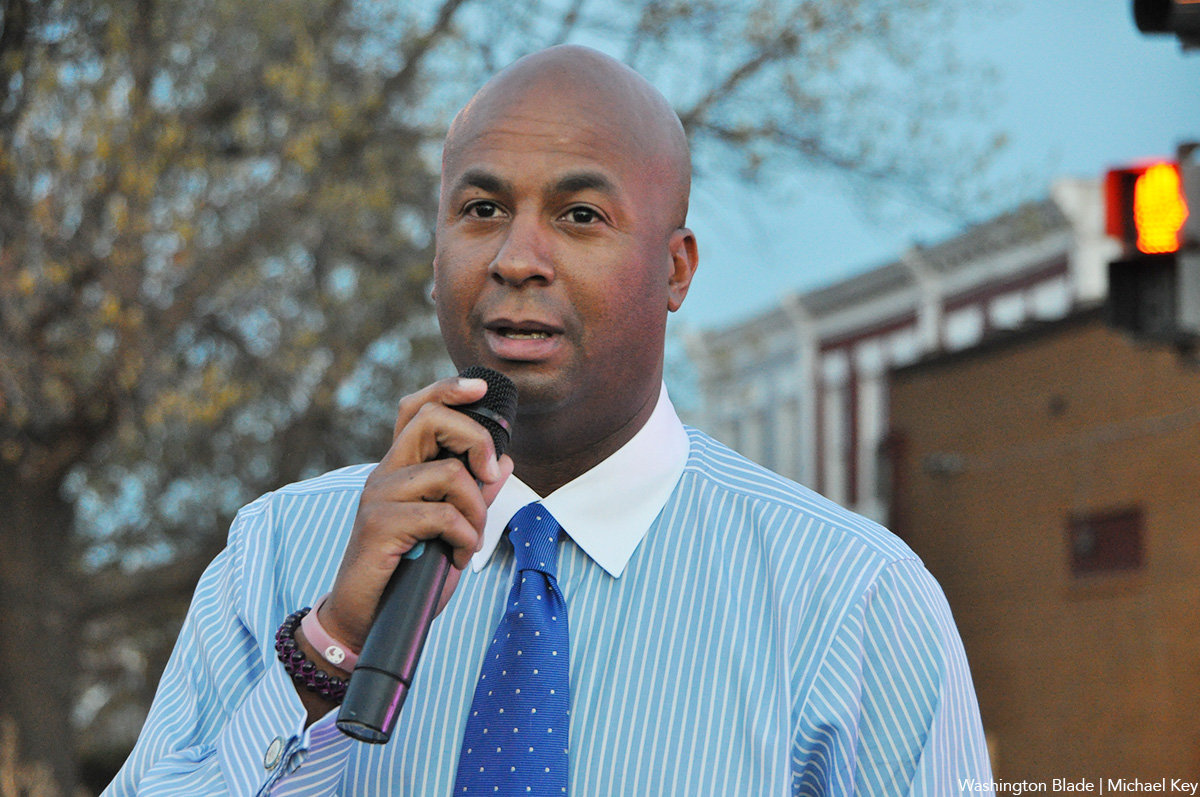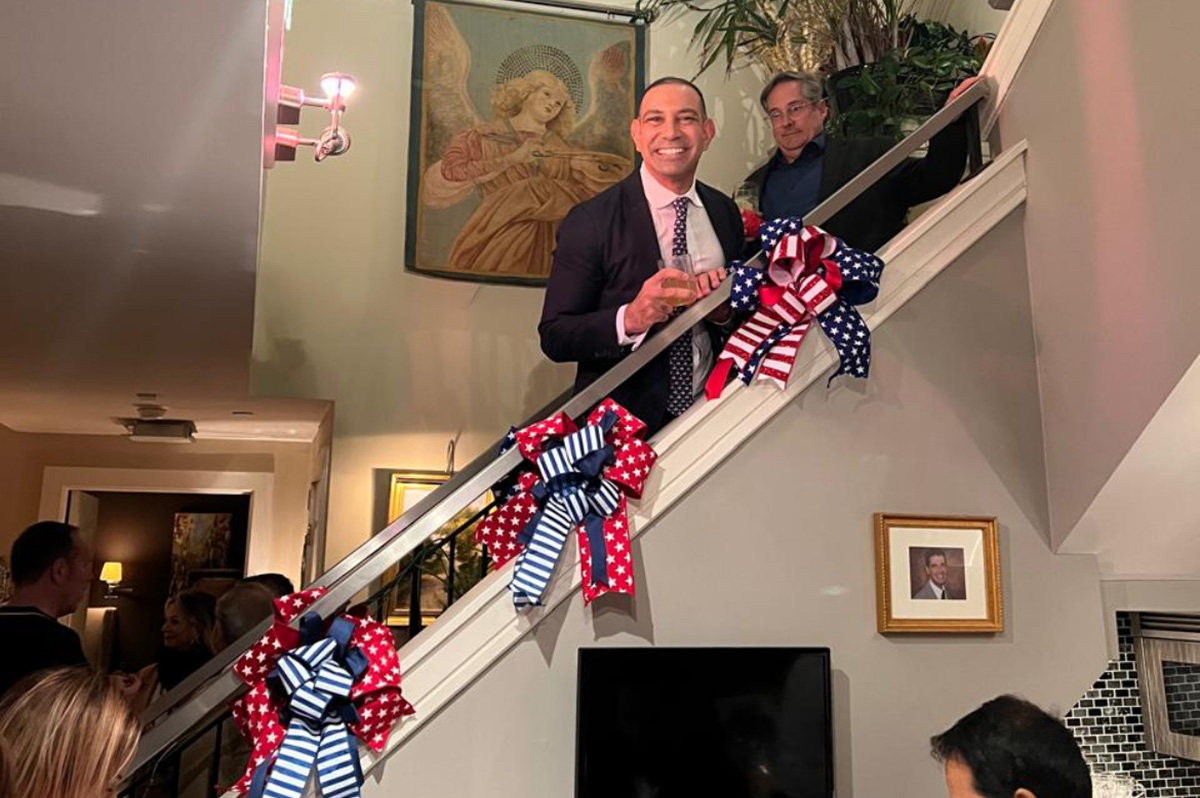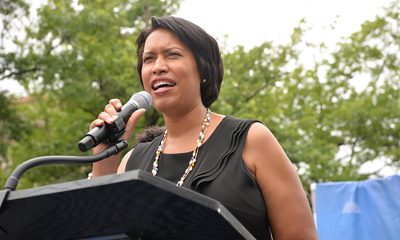District of Columbia
Former Council member Brown running for D.C. congressional delegate
Says he will be more ‘proactive’ in supporting LGBTQ issues than Holmes Norton

Michael A. Brown, who served as an independent At-Large member of the D.C. Council from 2009 to 2013 and emerged as a strong supporter of LGBTQ rights, says he is running in the city’s June Democratic primary for D.C.’s non-voting delegate to the U.S. House of Representatives.
Brown and five other lesser-known candidates are challenging incumbent Del. Eleanor Holmes Norton (D), who has held the seat since 1991 and announced she is running for re-election for her 18th two-year term in office.
Norton has been a longtime outspoken supporter of LGBTQ rights, and her supporters say she has done all she could to fight anti-LGBTQ amendments and other hostile initiatives introduced by Republican House members in recent years.
Brown told the Washington Blade in an interview last week he has picked up nominating petitions to begin the process of obtaining a required 2,000 signatures to get on the primary ballot. He said he has no disagreements with Norton on the issues facing D.C. in Congress.
“And I have a great amount of respect for her,” he said. “I just think it’s time for a new voice, a new, more aggressive and proactive voice that wants to get into the fight against people that are trying to harm the LGBT community” and the city, he told the Blade
“So, my respect for her, again, is tremendous,” he said. “I just think it’s time for a new voice. And with the track record I have with the LGBT community, I look forward to that fight. And I look forward to their support.”
He points out that he was among those who pushed for D.C. Council legislation legalizing same-sex marriage and strengthening the city’s hate crimes law.
Brown, 57, an attorney, currently works as Senior Adviser for the D.C.-based international law firm Potomac International Partners, Inc., which specializes in lobbying on behalf of both nonprofit advocacy organizations and corporations. Prior to his term on the D.C. Council, he worked for three other law firms that engage in lobbying and prior to that he worked as a legislative assistant to former U.S. Rep. Peter Rodino (D-N.J.).
He told the Blade that his longtime experience as a lobbyist on Capitol Hill gives him the inside knowledge of the workings of Congress that he will use for D.C.
Most D.C. political observers have said Norton is highly regarded among most D.C. voters, who have re-elected her by lopsided margins and she is expected to win another term once again in office. Some observers say that now, those who run against her most likely want to build name recognition for a future race for the non-voting delegate seat after Norton, who is 86 years old, retires.
In response to a request from the Blade for comment on Michael A. Brown’s decision to run against her, Norton released a short statement.
“I’m running again to represent my District of Columbia constituents for Congress,” she said. “I will be using my valuable seniority to continue to bring home benefits and to make progress on D.C. Statehood where it has passed twice in the House of Representatives.”
Among other things, Brown said he would take a more aggressive approach to fighting efforts by far-right Republican House members to introduce amendments to federal spending bills targeting LGBTQ rights, including those targeting transgender-related issues.
“We as a city seem to sit back and we’re always reactionary,” he said. “I would love to be more proactive about these particular issues. So, maybe these amendments never get put in in the first place,” Brown said, adding, “I would continue to work with Sen. Schumer to block these amendments.” He was referring to Sen. Charles Schumer (D-N.Y.), who currently serves as Senate Majority Leader.
Brown also acknowledged that his conviction on a federal bribery charge in 2014 after pleading guilty to accepting $55,000 in cash payments from undercover FBI agents posing as officials with a company trying to do business with the D.C. government will surface as an issue in his campaign for the congressional delegate seat. He was sentenced to a 39-month federal prison term before being released in 2017.
The Washington Post has reported Brown’s attorney attributed Brown’s illegal actions to personal financial challenges, including expenses related to a 2011 divorce. At the time of his sentencing Brown apologized for his actions and said he was “caught up in a culture of corruption running rampant in our city,” according to the Post.
“Obviously, people are aware of my history,” Brown told the Blade. “I’ve taken full responsibility for it and paid a price,” he said. “But you know, I’m not perfect. But I’m perfect for this job,” he said, referring to his run for the D.C. congressional delegate seat.
“And obviously I’m looking forward to really fighting hard for statehood and to keep these amendments from popping up related to the LGBT community,” Brown said.
District of Columbia
Bowser announces she will not seek fourth term as mayor
‘It has been the honor of my life to be your mayor’

D.C. Mayor Muriel Bowser, a longtime vocal supporter of the LGBTQ community, announced on Nov. 25 that she will not run for a fourth term.
Since first taking office as mayor in January 2015, Bowser has been an outspoken supporter on a wide range of LGBTQ related issues, including marriage equality and services for LGBTQ youth and seniors.
Local LGBTQ advocates have also praised Bowser for playing a leading role in arranging for widespread city support in the city’s role as host for World Pride 2025 in May and June, when dozens of LGBTQ events took place throughout the city.
She has also been credited with expanding the size and funding for the Mayor’s Office of LGBTQ Affairs, which was put in place as a Cabinet level office by the D.C. Council in 2006 under the administration of then-Mayor Anthony Williams.
It was initially called the Office of Gay, Lesbian, and Transgender Affairs. At Bowser’s request, the D.C. Council in 2016 agreed to change the name as part of the fiscal year 2016 budget bill to the Office of Lesbian, Gay, Bisexual, Transgender, and Questioning Affairs.
As she has in numerous past appearances at LGBTQ events, Bowser last month greeted the thousands of people who attended the annual LGBTQ Halloween 17th Street High Heel Race from a stage by shouting that D.C. is the “gayest city in the world.”
In a statement released after she announced she would not run for a fourth term in office; Bowser reflected on her years as mayor.
“It has been the honor of my life to be your mayor,” she said. “When you placed your trust in me 10 years ago, you gave me an extraordinary opportunity to have a positive impact on my hometown,” her statement continues.
“Together, you and I have built a legacy of success of which I am immensely proud. My term will end on Jan. 2, 2027. But until then, let’s run through the tape and keep winning for D.C,” her statement concludes.
Among the LGBTQ advocates commenting on Bowser’s decision not to run again for mayor was Howard Garrett, president of D.C.’s Capital Stonewall Democrats, one of the city’s largest local LGBTQ political groups.
“I will say from a personal capacity that Mayor Bowser has been very supportive of the LGBTQ community,” Garrett told the Washington Blade. “I think she has done a great job with ensuring that our community has been protected and making sure we have the resources needed to be protected when it comes to housing, public safety and other areas.”
Garrett also praised Bowser’s appointment of LGBTQ advocate Japer Bowles as director of the Office of LGBTQ Affairs,
“Under the leadership of the mayor, Japer has done a fantastic job in ensuring that we have what we need and other organizations have what they need to prosper,” Garrett said.
Cesar Toledo, executive director of the D.C. based Wanda Alston Foundation, which provides housing services for homeless LGBTQ youth, credits Bowser with transforming the Office of LGBTQ Affairs “into the largest and most influential community affairs agency of its kind in the nation, annually investing more than $1 million into life-saving programs.”
Toledo added, “Because of the consistent support of Mayor Bowser and her administration, the Wanda Alston Foundation has strengthened and expanded its housing and counseling programs, ensuring that more at-risk queer and trans youth receive the safety, stability, and life-saving care they deserve.”
Gay Democratic activist Peter Rosenstein is among those who have said they have mixed reactions to Bowser’s decision not to run again.
“I am sorry for the city but happy for her that she will now be able to focus on her family, and her incredible daughter,” Rosenstein said.
“She has worked hard, and done great things for D.C,” Rosenstein added. “Those include being a stalwart supporter of the LGBTQ community, working to rebuild our schools, recreation centers, libraries, gaining the RFK site for the city, and maintaining home rule. She will be a very hard act to follow.”
Local gay activist David Hoffman is among those in the city who have criticized Bowser for not taking a stronger and more vocal position critical of President Donald Trump on a wide range of issues, including Trump’s deployment of National Guard soldiers to patrol D.C. streets. Prior to Bowser’s announcement that she is not running again for mayor, Hoffman said he would not support Bowser’s re-election and would urge the LGBTQ community to support another candidate for mayor.
Bowser supporters have argued that Bowser’s interactions with the Trump-Vance administration, including her caution about denouncing the president, were based on her and other city officials’ desire to protect the interests of D.C. and D.C.’s home rule government. They point out that Trump supporters, including Republican members of Congress, have called on Trump to curtail or even end D.C. home rule.
Most political observers are predicting a highly competitive race among a sizable number of candidates expected to run for mayor in the 2026 D.C. election. Two D.C. Council members have said they were considering a run for mayor before Bowser’s withdrawal.
They include Councilmember Janeese Lewis George (D-Ward 4), who identifies as a democratic socialist, and Councilmember Kenyan McDuffie (I-At-Large), who is considered a political moderate supportive of community-based businesses. Both have expressed strong support for the LGBTQ community.
The Washington Post reports that Bowser declined to say in an interview whether she will endorse a candidate to succeed her or what she plans to do after she leaves office as mayor.
Among her reasons for not running again, she told the Post, was “we’ve accomplished what we set out to accomplish.”
District of Columbia
Fadi Jaber’s Middle Eastern background shapes Adams Morgan bakery
The Cakeroom is on 18th Street, N.W.

Fadi Jaber is the gay owner behind the Cakeroom’s bright pink facade on 18th Street, N.W. He combines his Middle Eastern background and American flavors to bring a nostalgic spread of desserts to Adams Morgan.
Born and raised in a U.S. compound in Saudi Arabia, Jaber first unlocked an interest in classic American desserts from his classmates.
“I was jealous that their moms would bring these delicious cupcakes to school when it was their birthdays, and my mom never made stuff like that. It was just grape leaves and hummus and very good Arabic food,” Jaber said.
After years of making boxed cake mixes in Saudi Arabia, Jaber tried a carrot cake from a friend’s wife from the U.S. He soon decided to make the recipe himself. When letting his parents sample the treat, Jaber’s mother suggested adding dates instead of carrots.
Now, Jaber sells the same date cake at the Cakeroom.
Jaber solidified his appreciation for American baked goods after a friend took him to Magnolia’s Bakery in New York. The visit inspired him to enroll in the Institute of Culinary Education.
“I just fell in love with the concept, and it was very much up my alley,” Jaber said. “I was already baking from scratch and making homemade style desserts that weren’t super chichi and elegant, but more just delicious and fun and nostalgic, and a throwback to people’s childhood.”
Upon leaving culinary school, Jaber moved to Jordan, where his parents relocated. He decided to leave his corporate job and open a bakery. According to Jaber, his father initially refuted the idea until he tried the desserts Jaber perfected in culinary school.
“He was part of the Palestinian diaspora. So, you know, given all the instability in his life having been forced out of their homes in 1948, it was really a very scary thought to add more instability by going out on your own and starting your own business,” Jaber said.
Jaber then opened Sugar Daddy’s, his first bakery, in Amman, Jordan, in 2007.
According to Jaber, the bakery was the first cupcake shop in the Middle East. He soon launched additional locations in Beirut, Lebanon, and Dubai, United Arab Emirates.

After six years, Jaber decided to return to the U.S. Jaber noted that he had “always longed” to live there, but he struggled to make his cakes a novel concept to an American audience.
“I’m kind of bringing pasta to the Italians, in a sense, where my cupcakes were very unique in Jordan, they wouldn’t be as unique in D.C.,” Faber said. “But my mom had confidence. She didn’t even bat an eye, and she was like, ‘I think you should do it.’”
Years prior, Jaber began visiting Washington while attending the College of William & Mary. Upon the move, he settled on Washington as a less competitive market than New York, citing his appreciation for the city’s international feel, architecture and nature.
After recruiting investors, Jaber opened Sugar Daddy’s in Adams Morgan in December 2013. However, upon being struck with a cease and desist letter from a bakery in Ohio with a similar name, Jaber experimented with 20 different names for the business.
Finally, he settled on the Cakeroom in the summer of 2014.
“I actually got some calls from D.C. government employees thanking me for the name change, because they said Sugar Daddy’s didn’t look good when they would Google it on their work laptops,” Jaber said, jokingly.

As for Jaber’s identity as a gay man, he notes that he hopes customers visit the Cakeroom because “they like our product” rather than due to his sexual identity. Still, he notes that operating the bakery in an LGBTQ-friendly city increases business opportunities to bake for LGBTQ weddings.
“A lot of people know me as the owner, I’m the face behind the brand. People in D.C. know that I’m gay, so I think we do get some business that way, but I would hate for people to just support my business because of my sexual orientation,” Jaber said.
Jaber manages the Cakeroom remotely, focusing on online orders, deliveries, scheduling, ordering, cash management, and more. He notes that while most days are routine, “at least two, three times a week there’s some firefighting that needs to happen.”
While Jaber does not intend on opening another location of the Cakeroom, he hopes to continue managing the business for another decade.
“I’ve been in this industry for 18 years,” Jaber said. “So if I can just keep it afloat, that would be my hope. It gives me purpose on a daily basis.”
Jaber’s top recommendations from the Cakeroom’s array of sweets include Nutella cookies, the date cake, and the carrot cake.
The carrot cake is based on the dessert that first inspired Jaber to pursue a career in baking.
“I think I altered it just a tiny bit, but for the most part, it is based off of the original recipe that I got from my friend’s wife,” Jaber said.
District of Columbia
D.C.’s LGBTQ bookstore moves to new location
Little District Books’ larger shop to host more authors, book club events

Little District Books, D.C.’s only LGBTQ bookstore, in early October moved its store from the Barracks Row section of Capitol Hill to a new, larger space at 631 Pennsylvania Ave., S.E. in a more prominent location on Capitol Hill less than a block from the Eastern Market Metro station.
The store, which describes itself on its website as a “queer owned and operated” independent bookstore that “celebrates LGBTQ+ authors and stories,” first opened in its previous location on 8th Street, S.E. in June 2022.
At that time it became the first D.C. LGBTQ bookstore since 2009, when the city’s famed Lamda Rising LGBTQ bookstore closed its doors after its owner Deacon McCubbin retired.
Little District Books owner, D.C. attorney Patrick Kern, said his main reason for moving was to find a larger space in which to provide a larger number of books and to host larger events. Among the events he said his store has hosted in the previous location were author book-signings and meetings of a number of book clubs.
“We started looking for somewhere that would allow us to do a lot more,” he told the Washington Blade. “So, in the old space we had like 2,800 different titles,” he said. “And in this new space we will be able to go up significantly. We are probably closer to 4200 titles at this point. We will likely get closer to 5000 next year.”
According to Kern, the old location was only about 700 square feet, with the new location providing nearly 2,000 square feet.
“We have a lot of plans,” Kern said. “We will launch a little café corner later this year, so we’ll have a more dynamic in-space experience,” he said. “We’re going to have a little tea counter where you can buy hot drinks” as well as cold non-alcoholic beverages, he said.
Kern has said Little District Books carries books that cover a wide range of topics and stories, both fiction and nonfiction.
“We have books by LGBT authors about LGBT topics. We have books by LGBT authors about non-LGBT topics,” he said. “And then I have LGBT stories that are written by non-LGBT people as well,” he told the Blade in a July 2023 interview.
He told the Blade last week that he was hopeful that the new location’s larger space, that will allow more and larger events and more books, will continue to prompt people to come into the store to buy their books rather than buy them through online sites where most books are now sold.
-

 District of Columbia4 days ago
District of Columbia4 days agoBowser announces she will not seek fourth term as mayor
-

 U.S. Military/Pentagon5 days ago
U.S. Military/Pentagon5 days agoPentagon moves to break with Boy Scouts over LGBTQ and gender inclusion
-

 Drag5 days ago
Drag5 days agoPattie Gonia calls out Hegseth’s anti-LGBTQ policies — while doing better pull-ups
-

 District of Columbia5 days ago
District of Columbia5 days agoFadi Jaber’s Middle Eastern background shapes Adams Morgan bakery


















